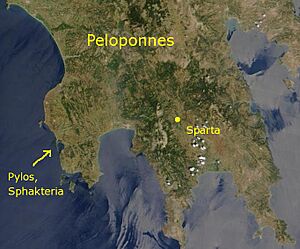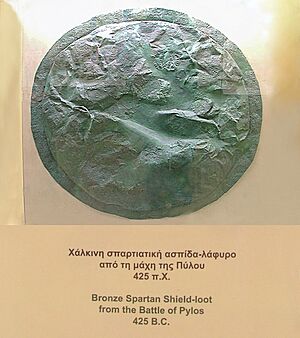Battle of Pylos facts for kids
Quick facts for kids Battle of Pylos |
|||||||
|---|---|---|---|---|---|---|---|
| Part of the Peloponnesian War | |||||||
 |
|||||||
|
|||||||
| Belligerents | |||||||
| Athens | Sparta | ||||||
| Commanders and leaders | |||||||
| Demosthenes | Thrasymelidas, Brasidas |
||||||
| Strength | |||||||
|
|
||||||
| Casualties and losses | |||||||
| 8 ships | 18 ships 420 hoplites captured |
||||||
The Battle of Pylos was a big naval fight in 425 BC. It happened during the Peloponnesian War near a place called Pylos. This area is now known as Navarino Bay in Messenia. In this battle, the Athenians won a major victory against their rivals, Sparta.
The battle started when an Athenian fleet was forced ashore at Pylos by a storm. A smart Athenian general named Demosthenes convinced his soldiers to build a fort there. When the main fleet left, a small group of Athenians stayed behind to guard the new fort.
Sparta was very worried about an Athenian fort so close to their land. Their army, led by Agis, quickly left their invasion of Attica and rushed home. The Spartan fleet also sailed to Pylos to deal with the Athenians.
Demosthenes had only a small force, about 600 men. Only 90 of these were heavily armed soldiers called hoplites. He sent two ships to warn the main Athenian fleet about the danger. The Spartans, however, had 43 warships and a large army on land. Demosthenes prepared his men for a tough fight. He put most of his soldiers where the fort met the mainland. He also picked 60 hoplites and some archers to defend the weakest part of the wall, facing the sea. This was where he expected the Spartans to attack.
The Spartans attacked Pylos from both land and sea, just as Demosthenes had guessed. The Athenians fought bravely for a day and a half. They stopped the Spartans from breaking through their defenses. Because they couldn't storm the fort, the Spartans decided to surround it instead.
Contents
The Athenian Fleet Arrives
While the Spartans were getting ready for a long siege, the Athenian fleet arrived. They had 50 warships. The Spartans had not blocked the harbor entrance, so the Athenians sailed right in. They surprised the Spartan fleet and defeated them. This gave Athens control of the harbor.
This victory had a huge impact. It trapped 420 Spartan hoplites on a nearby island called Sphacteria. About 120 of these were from the Spartiate class, who were Sparta's most important and elite soldiers. This news caused a panic in the Spartan government.
Spartan leaders quickly came to Pylos to make a deal. They agreed to a ceasefire and gave their entire fleet to the Athenians as a promise of good behavior. They also sent ambassadors to Athens to try and make a lasting peace.
However, the peace talks failed. The Athenians kept the Spartan ships and began to surround the trapped hoplites on Sphacteria. Later, in the Battle of Sphacteria, these Spartan soldiers were captured. They were taken as hostages to Athens. Pylos remained an Athenian base. It was used for raids into Spartan land and as a safe place for runaway Spartan Helots (enslaved people).
Why Pylos Was Important
In the summer of 425 BC, an Athenian fleet was sailing to help their allies in Sicily and Corcyra. Demosthenes was an advisor on this fleet. He had a secret plan: he wanted to stop and build a fort at Pylos. He thought Pylos was a great spot for a military outpost. It was far from Sparta and had an excellent harbor.
At first, the generals in charge of the fleet didn't like Demosthenes' idea. But then, a big storm hit and forced the fleet to land at Pylos. Even with the storm, the generals didn't want to build a fort. Demosthenes tried to convince the soldiers directly. Finally, the soldiers got bored waiting for the storm to pass and decided to start building. They worked very hard and quickly. In just a few days, the fort was strong and ready to defend. The main fleet then sailed off, leaving Demosthenes with five ships and their crews to protect the new fort.
Sparta's Reaction to the Fort
The Spartan government didn't worry much at first, thinking the Athenians would soon leave Pylos. But when it became clear that Demosthenes planned to stay, they got very concerned. Their king, Agis II, who was leading an army attacking Attica, immediately turned his army around and went home.
Once Agis was back, Spartan forces quickly moved towards Pylos. Their fleet at Corcyra was ordered to sail there right away. Sparta also called on its allies around the Peloponnese to send troops. The Spartan fleet managed to sneak past the Athenian fleet. But Demosthenes had expected them. He sent two of his ships to tell the Athenian fleet about the danger at Pylos. The Athenian fleet then set off for Pylos as fast as they could.
Meanwhile, Pylos got some help. A private ship arrived with weapons, which were given to the sailors. Also, a small Messenian boat brought 40 more hoplites to help defend the fort. Demosthenes divided his small force. Most of his men were placed at the part of the fort connected to the mainland. He, with 60 hoplites and some archers, waited at the weakest point facing the sea. This was where he believed the Spartans would try to land. When the Spartan fleet arrived, they planned to block the harbor entrance. They put hoplites on Sphacteria island, which was in the middle of the entrance. They planned to place ships in the gaps around the island when the Athenian fleet arrived.
The Battle Begins
The Spartans attacked the Athenian fort at Pylos from both land and sea. The sea attack happened exactly where Demosthenes had predicted. He and his men were ready. Landing on the beach was very difficult because of the rocks. Only a few of the 43 Spartan warships could approach the shore at a time. Spartan captains, like their brave leader Brasidas, even crashed their ships onto the rocky shore. They did this to give their men a chance to jump off and push the Athenians back. But the Athenian defenders held their ground. Wave after wave of Spartan attacks failed to break them. Trying to land troops on a beach against strong hoplite resistance was known to be extremely hard in those days. These attacks continued for a whole day and part of the next. After that, the Spartans gave up trying to storm the fort. They decided to start a siege instead and sent ships to get wood for siege machines.
The day after the attacks stopped, the Athenian fleet arrived from Zacynthus. It was too late to attack that day, so the Athenians spent the night on a nearby island. They hoped to trick the Spartans into fighting them in the open sea. But the Spartans refused to leave the harbor. The next morning, the Athenians sailed into both entrances of the harbor. The Spartans had failed to block these entrances. The Athenians quickly defeated the Spartan fleet.
The harbor was small, so the chase was limited. But the Athenians captured some Spartan warships at sea. Then, they landed to try and capture more Spartan ships that had reached the shore. A fierce fight broke out on land. The Athenians couldn't capture many more ships and pulled back after both sides suffered many losses. By the end of the battle, the Athenians controlled the harbor. They could sail freely around Sphacteria island. They guarded the island closely, making sure the Spartan hoplites trapped there couldn't escape.
What Happened Next
News of the crisis at Pylos shocked the Spartan government. Leaders were immediately sent to the scene to negotiate a ceasefire. This strong reaction to the possible capture of just 420 soldiers might seem extreme. But it's because the 120 Spartiates on the island made up about one-tenth of their most important warrior class. This elite group was the foundation of the Spartan government.
The Spartan negotiators met with the Athenian generals at Pylos. They quickly agreed to stop fighting right away. The Spartans were allowed to send food to their men on the island. They also sent a group of ambassadors to Athens to try and make a lasting peace. All the Spartan ships were given to the Athenians as a guarantee that Sparta would act honorably.
When the Spartan ambassadors reached Athens, they spoke to the Athenian assembly. They argued that Athens should take this chance to make peace. They said Sparta had suffered bad luck, not because they were weak. They urged Athens to make peace on good terms.
However, a powerful Athenian politician named Cleon laughed at this idea. He demanded much tougher terms. He wanted Athens to control Megara and for Sparta to abandon some important allies. Cleon reminded the Athenians of the difficult terms they had to accept in the Thirty Years' Peace of 445 BC. At that time, Athens was at a disadvantage. Cleon believed that Athens had little to gain from a peace that gave up their current advantage. He thought they could get much better terms later by pushing their advantage.
When the Spartans asked to discuss these proposals in private, Cleon insisted they speak in public. By doing this, he made sure the Spartans would have to stop the talks. They couldn't openly discuss betraying their allies in public. This sped up the moment when Athens would be free to attack Sphacteria.
The Spartan ambassadors went home, and the ceasefire at Pylos ended. The Athenians claimed the Spartans had broken the ceasefire by attacking their wall. So, they refused to give the Spartan ships back. Both sides prepared to fight for the fate of the men on Sphacteria. The final outcome would be decided later in the Battle of Sphacteria.
 | Charles R. Drew |
 | Benjamin Banneker |
 | Jane C. Wright |
 | Roger Arliner Young |


